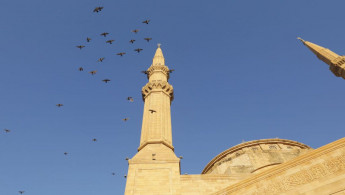Lebanon's Muslims furious after government deems Friday working day
Lebanon's Muslims furious after government deems Friday working day
Lebanon's official weekend holidays is proving to be a hot-button issue in the country, particularly as it was founded on the idea of sectarian power sharing.
3 min read
Lebanese Muslims are demanding Friday be recognized as part of the official weekend [AFP]
Controversy over official weekend holidays is proving to be a hot-button issue in Lebanon, a country founded on the idea of sectarian power sharing.
As part of a new salary scale approved by Lebanon's parliament last month, the government has increased public sector working hours and set Saturday and Sunday as the official weekend for civil servants.
Friday is the weekly holiday in Islam, however, a day in which devout Muslims hold collective prayers after a sermon, akin to the Christian Sunday and the Jewish Sabbath on Saturday.
One crucial difference is that Muslims are not required to observe Friday as a holiday outside of prayer hours, and are permitted to work and engage in commerce. Nevertheless, some Muslims in Lebanon - especially Sunnis who have jumped on the issue to express their political grievances - are seeing the non-recognition of the whole day as a holiday as an assault on their religious rights.
Increasingly, many Sunni Muslims in Lebanon feel their power is waning due to the dominance of Shia Hizballah in political life. This is despite a delicate power sharing deal reached last year to appoint Sunni Saad Hariri as prime minister in return for installing Hizballah's ally Michel Aoun as president.
Previously, Lebanon had a free floating weekend, with Sunday an official holiday but Friday and Saturday often being half-working days. The practice dates back to the time of French colonial authorities, which implemented this policy following pressure by Muslims.
Although the new law approves a few hours 'prayer break' on Friday, for many Muslims, this is considered not enough by some.
Mufti Abdul-Latif Derian - the highest Sunni Muslim religious authority in the country - has now endorsed a growing call in Muslim regions of Lebanon for adopting Friday and Sunday as the official weekend. Some municipal authorities in north Lebanon have said they will defy the new law and observe Friday and Sunday as holiday.
According to local press reports, the issue is quickly snowballing into a major political headache especially for Sunni Prime Minister Saad al-Hariri, who appears to have ignored the demands of his own constituency in approving the measures.
The government's argument is that Friday is a working day in most of the world, and shuttering government departments would decrease productivity. Critics say Friday is already a holiday in most of the Arab world.
According to local press reports, mosque sermons across Lebanon this Friday railed heavily against Hariri and the Lebanese government, proclaiming the move to be an insult to Muslims in Lebanon.
"[The government] must do justice by the Muslim partners in the homeland," said Ziad Zakaria, the Sunni Muslim mufti of Akkar.
"The disregard for the voice of Dar al-Fatwa jeopardises the power-sharing formula in the country, and ushers in a worrisome new era that will stoke sectaranism," he said, in reference to the office of the mufti of the republic.



